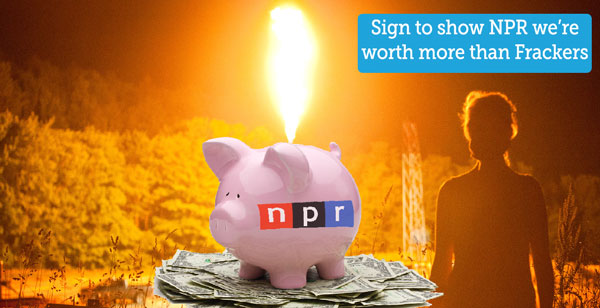|
Friend,
Wow. Last week we asked NPR to divest from fossil fuels, including the pro-fracking American Natural Gas Association (ANGA) ads so many of you have heard and and then wrote to complain about. We also asked you to indicate what your approximate annual contribution to public media was, so we could show NPR that their listeners are worth more than the frackers -- in addition to being morally right to oppose fracking and climate change.
Thousands of listeners responded, representing local and national public radio pledges of more than $637,675 so far. And we're just getting started.
Divesting from fossil fuels -- including rejecting ad money from companies, like ANGA, that profit from the destruction of our climate -- is the right thing for any media company to do. But it's especially important for PUBLIC media, like NPR, because it's supported by so many regular people like us -- and not just as listeners but as donors and supporters as well. We are the PUBLIC in National Public Radio, and when we speak together we have the power to make really newsworthy change.
In just one week, we've already shown that we're a valuable piece of NPR's financial base. But it's going to take a lot more support before NPR gives up on fossil fuels for good. Can you help grow our movement for people-powered clean energy news by sharing this action with five friends this week? Click here to spread the word on Facebook, Twitter and your social networks - or just forward the email below to anyone you know who loves public radio and hates fracking.
Thanks,
Drew and the frack free radio team at Environmental Action.
Universities are doing it, Newspapers are doing it, millions of people with billions of dollars in assets are doing it. Why can't National PUBLIC Radio divest from fossil fuels like the rest of us? Click here to show them why it's moral, feasible, and past time to stop taking frackers' dirty money and stop telling their dirty lies.
Friend,
This has been an amazing year for the global Divestment movement. Major companies, philanthropies, universities and even the country of Norway have pledged to stop taking and making money off the worst fossil fuel companies.1 Their reasons aren't just altruistic - the clean energy economy is generating good jobs, big profits and major innovations in addition to NOT cooking the planet and all of us who live on it. But every decision to divest is based on one fundamental truth: If we accept the science of climate change, and understand that we're all impacted by the climate crisis, then we're compelled to act because without a safe and stable climate there won't be any jobs, economy or standard of living to worry about.
And while Wall Street, Main Street and every other place have been waking up to the need to keep fossil fuels in the ground, what has NPR been doing? Slashing their climate reporting staff, taking big donations from fossil fuel polluters and running story after slanted-story about the 'benefits' of fracked gas and other fossil fuels.*
To make the divestment decision as straight forward for NPR as it is for other media companies, we need to show them what it (and we) are worth. That's why I'm asking you to sign our petition asking NPR to reject fossil fuel money - and go a step further by telling NPR the approximate value of your annual donation to public media.

We're not asking you to boycott NPR, yet. A lot of Environmental Action members have already told us, and your local stations, that you won't donate to public radio until they reject money from the frackers and other fossil fuel companies. That's awesome, but you can still believe in, and donate to, public media and support this step in the campaign.
Last April, the U.K. based Guardian became the largest media company ever to divest from fossil fuels.2 In announcing why the Guardian was getting out of fossil fuels, board chair Neil Berkett said, "We are not doing this because it makes good headlines. We are doing it because it makes good business sense."3
Here in the U.S., it makes good business sense for NPR to divest from fossil fuels too - starting by rejecting the money and ads from the American Natural Gas Alliance (ANGA). The economics are simple -- in addition to refusing to make money from an industry that destroys our water, air and climate, NPR would prioritize individual listeners and donors like us more than support from fossil fuels by divesting.
And that's not just a good headline, it's smart business since public radio's largest source of funding is from individual member stations -- and those local stations get the majority of their funding from listeners like you and me.4
Let's help NPR wake up to the urgency, power and good-business sense of divestment by showing them how much our movement is worth.
Thanks,
Drew and the public media divestment crew at Environmental Action
* PS - Did you hear a story about fracked gas or extreme energy on NPR that was biased or made you question their integrity? We're making a list of examples to deliver to their ombud later this fall - Click here to fill out a short survey on what you heard and help us clear the air about fossil fuel coverage at NPR.
Drew and the frack free radio crew at Environmental Action
1 - Divestment updates, global, gofossilfree.org
2 - Damain Carrington, Guardian Media Group to divest its £800m fund from fossil fuels, The Guardian, April 1, 2015
3 - Neil Berkett, Why the Guardian Media Group is getting out of fossil fuels, The Guardian, April 1, 2015
4 - NPR, Public Radio Finances, 2015 |
